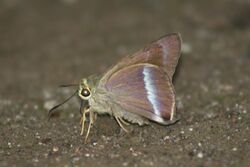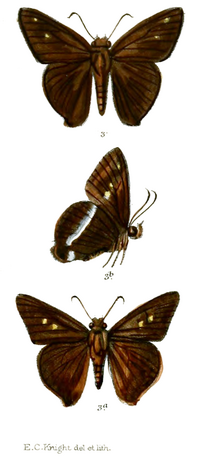Biology:Hasora vitta
| Plain banded awl | |
|---|---|

| |
| Scientific classification | |
| Domain: | Eukaryota |
| Kingdom: | Animalia |
| Phylum: | Arthropoda |
| Class: | Insecta |
| Order: | Lepidoptera |
| Family: | Hesperiidae |
| Genus: | Hasora |
| Species: | H. vitta
|
| Binomial name | |
| Hasora vitta (Butler, 1870)[1]
| |
Hasora vitta, the plain banded awl,[2][3][4] is a butterfly belonging to the family Hesperiidae which is found in India and parts of Southeast Asia.[5]
Description
The butterfly, which has a wingspan of 45 to 55 mm, is dark brown above. It resembles the common banded awl (Hasora chromus), except in the case of having a broad white band on the under hindwing which is outwardly diffused; also, its wings are more prominently glossed.[6][7]
Other differentiating characteristics are:
Male: The upper forewing has an apical spot, sometimes with another in 3. The upper forewing has no brand.[6]
Female: The apical spot in the case of the female is larger, and there is an additional spot in 2.[6]
Taxonomy
The butterfly has two subspecies:
- Hasora vitta vitta - South Myanmar (Dawnas), Malaya peninsula, Indonesian archipelago and Philippines .[4][8]
- Hasora vitta indica - South India, Sikkim, Assam, North Myanmar, Thailand and south western China .[4][8]
Range
The plain banded awl is found in India in the south (Kanara), Sikkim, Assam[2] and eastwards to Myanmar, Thailand, western China , Malaysia, Indonesia and the Philippines .[4][8]
Status
Not rare as per Evans (1932).[8] Not common as per Wynter-Blyth (1957).[6]
Host-plants
The caterpillars have been recorded on Derris spp., Pongamia spp., Millettia extensa, Endosamara racemosa, Millettia glabra and Spatholobus ferrugineus.[4][9]
Cited references
- ↑ Beccaloni, G.; Scoble, M.; Kitching, I. et al., eds (2003). "Hasora vitta". The Global Lepidoptera Names Index. Natural History Museum. https://www.nhm.ac.uk/our-science/data/lepindex/detail/?taxonno=184119. Retrieved April 20, 2018.
- ↑ 2.0 2.1 R.K., Varshney; Smetacek, Peter (2015). A Synoptic Catalogue of the Butterflies of India. New Delhi: Butterfly Research Centre, Bhimtal & Indinov Publishing, New Delhi. pp. 26. doi:10.13140/RG.2.1.3966.2164. ISBN 978-81-929826-4-9. https://www.researchgate.net/publication/287980260.
- ↑ TOL web page on genus Hasora
- ↑ 4.0 4.1 4.2 4.3 4.4 Markku Savela's website on Lepidoptera - page on genus Hasora.
- ↑ W. H., Evans (1949). A Catalogue of the Hesperiidae from Europe, Asia, and Australia in the British Museum. London: British Museum (Natural History). Department of Entomology. pp. 68. https://www.biodiversitylibrary.org/item/187283#page/92/mode/1up.
- ↑ 6.0 6.1 6.2 6.3 Wynter-Blyth, Mark Alexander (1957). Butterflies of the Indian Region. Bombay, India: Bombay Natural History Society. p. 468. ISBN 978-8170192329. https://books.google.com/books?id=yEkgAQAAMAAJ.
- ↑ Kunte, Krushnamegh (2000). Butterflies of Peninsular India. India, A Lifescape. Hyderabad, India: Universities Press. p. 192. ISBN 978-8173713545. https://books.google.com/books?id=cuPPjOMcu_4C.
- ↑ 8.0 8.1 8.2 8.3 Evans, W.H. (1932). The Identification of Indian Butterflies (2nd ed.). Mumbai, India: Bombay Natural History Society. p. 315, ser no I 1.13.
- ↑ Ravikanthachari Nitin; V.C. Balakrishnan; Paresh V. Churi; S. Kalesh; Satya Prakash; Krushnamegh Kunte (2018-04-10). "Larval host plants of the buterfies of the Western Ghats, India". Journal of Threatened Taxa 10 (4): 11495–11550. doi:10.11609/jott.3104.10.4.11495-11550. http://threatenedtaxa.org/index.php/JoTT/article/view/3104/4402.
References
- Evans, W.H. (1932). The Identification of Indian Butterflies (2nd ed.). Mumbai, India: Bombay Natural History Society.
- Kunte, Krushnamegh (2000). Butterflies of Peninsular India. India, A Lifescape. Hyderabad, India: Universities Press. ISBN 978-8173713545. https://books.google.com/books?id=cuPPjOMcu_4C.
- Wynter-Blyth, Mark Alexander (1957). Butterflies of the Indian Region. Bombay, India: Bombay Natural History Society. ISBN 978-8170192329. https://books.google.com/books?id=yEkgAQAAMAAJ.
Online
- Beccaloni, George; Scoble, Malcolm; Kitching, Ian; Simonsen, Thomas; Robinson, Gaden; Pitkin, Brian; Hine, Adrian; Lyal, Chris. "The Global Lepidoptera Names Index (LepIndex)". Natural History Museum, London. http://www.nhm.ac.uk/our-science/data/lepindex/.
- Brower, Andrew V. Z., (2007). Hasora Moore 1881. Version 21 February 2007 (under construction). Page on genus Hasora in The Tree of Life Web Project http://tolweb.org/.
- "Markku Savela's website on Lepidoptera". http://www.nic.funet.fi/pub/sci/bio/life/insecta/lepidoptera/.
Wikidata ☰ Q3595400 entry
 |


